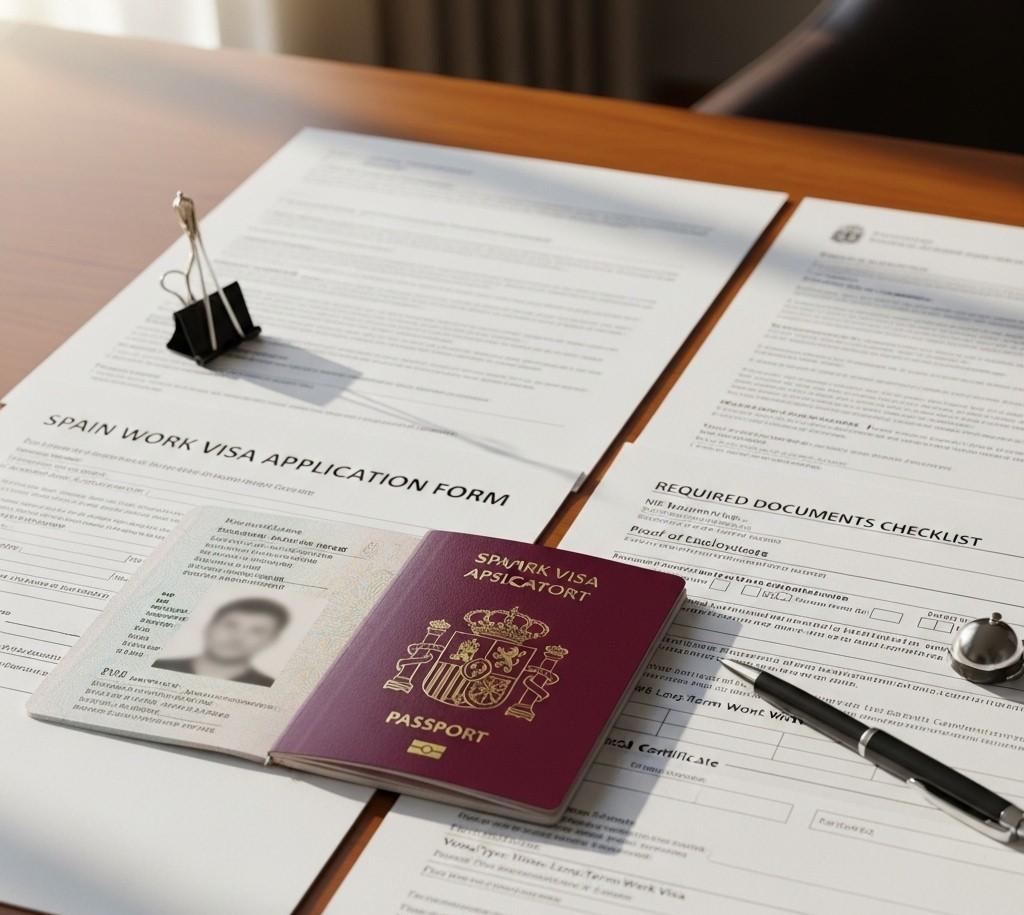Dreaming of swapping your current routine for sun-drenched afternoons and a vibrant career in Spain? You’re not alone. The path to making this a reality is clearer than you might think, starting with understanding the Spain Job Seeker Visa pathways available in 2025. This guide is designed to cut through the confusion, offering a clear, actionable roadmap to help you navigate the process. We’ll explore the main job seeker visa, its lesser-known alternatives, and the practical steps you need to take to turn your Spanish dream into a well-executed plan.

Spain Job Seeker Visa
| Pathway | Ideal Candidate | Key Requirement |
| Job Search Visa | Recent graduates from a Spanish university. | Completed a level 6 (Bachelor’s) or higher degree in Spain. |
| Digital Nomad Visa | Remote workers and freelancers. | Minimum monthly income of around €2,646 (200% of Spain’s SMI). |
| Highly Qualified Pro Visa | Professionals with a specific job offer. | A binding job offer for a managerial or technical role. |
Understanding Spain’s Welcome Mat for Global Talent
Spain is actively looking to attract skilled professionals. The government has streamlined several visa options to bring international talent into its growing economy. While many people think you need a job offer before you can even think about moving, certain pathways are specifically designed to let you look for work after you arrive .Spanish Ministry of Inclusion, Social Security and Migrations.
The Primary Pathway: Visa for Job Search (Visa para Búsqueda de Empleo)
This is the official Spain Job Seeker Visa, but it comes with a very specific requirement that’s often misunderstood. It’s not for everyone; it’s a golden bridge for a specific group of people.
Who Is This Visa Really For?
This visa is designed exclusively for non-EU nationals who have recently completed their studies in Spain. Think of it as a post-study work permit that grants you 12 months (extendable up to 24 months in some cases) to stay in Spain and search for a job or start your own business.
To be eligible, you must have successfully completed a Level 6 (Bachelor’s degree), Level 7 (Master’s degree), or Level 8 (Doctorate) qualification at a recognized Spanish higher education institution.
Key Eligibility Requirements for 2025
If you fit the student profile, here’s what you’ll need to prepare:
- Proof of Graduation: Your official diploma or a certificate confirming you have completed your studies and paid all relevant fees.
- Financial Sufficiency: You must prove you can support yourself without public funds. The requirement is 100% of Spain’s IPREM (Indicador Público de Renta de Efectos Múltiples). As of late 2024, this was €600 per month, meaning you’d need to show access to at least €7,200 for the year. This figure is updated annually, so always check the latest amount.
- Comprehensive Health Insurance: You need a policy with a company authorized to operate in Spain that provides full coverage, with no co-payments.
- Clean Criminal Record: A criminal record certificate from your home country (and any country you’ve lived in for the past five years), properly translated and apostilled.
- Completed Application Form: The correct, filled-out national visa form.
The Application Process, Step-by-Step
The great advantage of this visa is that you apply for it from within Spain.
- Timing is Everything: You must apply within the 60 days before your student visa (Estancia por Estudios) expires or up to 90 days after it has expired.
- Gather Your Documents: This is the most crucial step. Organize everything on the checklist above. In my experience advising applicants, the most common hurdle is improperly authenticated or translated documents. Give yourself ample time for this.
- Submit Your Application: The application is submitted electronically through the official portal of the Ministry of Territorial Policy.
- Wait for a Decision: The standard processing time is around 20 working days.
- Find a Job: Once approved, your 12-month clock starts ticking. Now you can actively search for a job that aligns with your field of study. When you find one, you’ll then transition to a proper work permit.

Alternative Pathways: Move to Spain Without a Job Offer (Yet)
What if you didn’t study in Spain? Don’t worry, your dream isn’t over. Other popular routes allow you to establish yourself in the country, one of which has become a game-changer for remote professionals.
The Digital Nomad Visa: Your Remote Work Ticket
Launched in 2023, Spain’s Digital Nomad Visa is perfect for freelancers and remote employees who earn their income from companies outside of Spain. This visa allows you to live in Spain for up to five years while continuing your remote work.
Key Requirements:
- Proof of Remote Work: A contract showing you’ve been working remotely for your company or clients for at least three months.
- Sufficient Income: You must prove a monthly income of at least 200% of Spain’s Minimum Interprofessional Salary (SMI). For 2025, this will be approximately €2,646 per month for a single applicant.
- Professional Experience: You need to be a graduate from a reputable university or have at least three years of relevant professional experience.
Preparing a Winning Application: Universal Truths
No matter which visa you pursue, success hinges on meticulous preparation.
Financial Preparedness is Non-Negotiable
Every visa has a financial requirement. Start saving well in advance and keep your bank statements clean and easy to understand. Sudden large deposits can raise red flags, so aim for consistent savings that clearly show you meet the threshold.
Your Documents: The Devil is in the Details
Ensure every single document is correct.
- Translations: All foreign documents must be translated into Spanish by a sworn translator (traductor jurado).
- Apostilles: Documents like criminal record checks and university degrees often need an Apostille of The Hague to be legally valid in Spain. Check the specific requirements for your country.
- Validity: Make sure your passport, photos, and certificates are all within their validity dates.

Life After Approval: Navigating the Spanish Job Market
Once your visa is in hand, the real adventure begins. The Spanish job market is competitive but full of opportunities, especially in sectors like tech, tourism, renewable energy, and pharmaceuticals.
Major hubs like Madrid and Barcelona boast the most international opportunities, but don’t overlook thriving cities like Valencia, Málaga, and Bilbao, which offer a fantastic quality of life and growing job scenes.
Your Spanish Chapter Awaits
Navigating the Spain Job Seeker Visa process and its alternatives requires diligence, but it is an achievable goal. By identifying the right pathway for your circumstances, preparing your documents meticulously, and understanding the nuances of each application, you can position yourself for success. Spain offers an unparalleled blend of professional opportunity and quality of life. Start your research, gather your documents, and get ready to write your next chapter under the Spanish sun.
Navigating the U.S. Visa Integrity Fee: A Practical Guide for Applicants
A Global Look: United States Visa Interview Wait Times in All Sub-Continents
FAQs
Q1:What is the success rate for the Spanish Job Seeker Visa?
While official statistics aren’t widely published, success largely depends on meeting all eligibility criteria perfectly. A complete and accurate application that clearly demonstrates you meet the financial, educational, and legal requirements has a very high chance of approval.
Q2:Can I bring my family with me on these visas?
Yes, for most of these visas, including the Digital Nomad and Highly Qualified Professional visas, you can apply for your spouse, registered partner, and dependent children to join you. You will need to prove additional financial resources for each family member.
Q3:How much money do I really need to move to Spain?
Beyond the visa’s financial proof requirement (e.g., €7,200 for the Job Search Visa), you should budget for initial costs like a rental deposit (typically 1-3 months’ rent), first month’s rent, setting up utilities, and living expenses until you secure a job or your remote income stabilizes. A safe buffer would be an additional €3,000-€5,000.










